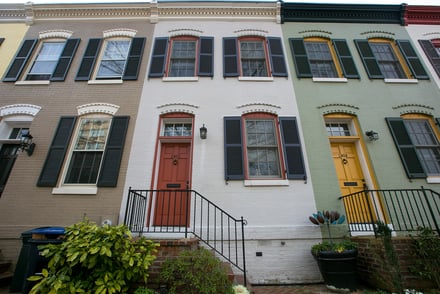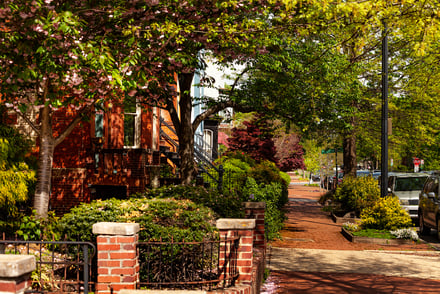 As spring and summer approach, the itch to spruce up your property and gardens can be irresistible. For owners of historic brick homes in Washington, D.C. though, it's vital to consider the unexpected impact some plants and shrubs can have on your aging brick foundation. In your quest for natural beauty and added curb appeal, the last thing you want to do is to potentially cause structural damage to your piece of residential history. Before you start overhauling your gardens, here's what you should know about protecting the integrity of your historic home.
As spring and summer approach, the itch to spruce up your property and gardens can be irresistible. For owners of historic brick homes in Washington, D.C. though, it's vital to consider the unexpected impact some plants and shrubs can have on your aging brick foundation. In your quest for natural beauty and added curb appeal, the last thing you want to do is to potentially cause structural damage to your piece of residential history. Before you start overhauling your gardens, here's what you should know about protecting the integrity of your historic home.
Why The Impact of Plants on Historic Properties Matter
Due to their age and the materials favored in the era they were constructed, historic brick foundations can be more vulnerable than new builds. Plants with aggressive root systems, for example, can infiltrate and disrupt mortar between bricks, potentially causing cracks and structural problems. Other plants can encourage the retention of moisture around the foundation, which can promote both mold growth and brick deterioration.
Plants That Can Be Hazardous to Your Historic Home's Health
Your home is likely one of your most significant and most treasured investments. You want to protect it for future generations, so it's vital to avoid planting things too close to your foundation. Here are some plants that can pose risks and should be avoided:
- English Ivy (Hedera helix): What's more charming than a gracefully aging home with a bit of ivy climbing across its facade? While English Ivy is a popular climbing plant, it can be especially dangerous to brick structures. For a similar timeless look without the invasive risks, consider using Boston Ivy (Parthenocissus tricuspidata).
- Tree of Heaven (Ailanthus altissima): Known for its incredibly aggressive root system, Tree of Heaven plants can spread rapidly and damage foundations profoundly with an extensive network of roots. Instead, opt for smaller ornamental trees with less invasive root systems, like the Dogwood (Cornus florida).
- Bamboo (Phyllostachys spp. and Fargesia spp.): Fast-growing and capable of creating a veritable wall of privacy, bamboo lends a bit of a tropical vibe that can be appealing. Unfortunately, it can quickly become wildly invasive and almost impossible to control. Instead, consider clumping varieties like Fargesia, which are much easier to maintain and less aggressive.
- Willow (Salix spp.): Graceful and charming, willows are also notorious for water-seeking roots that will stop at nothing in their quest for moisture. Drainage systems, foundations, and sewer pipes can all feel the wrath of willow trees. Consider a Redbud (Cercis canadensis) for its more contained root system and lower water demand.
Tips for Safe Planting
No matter what you plan to plant, you should know a few general rules before your garden makeover. If you're planting near your foundation, consider installing root barriers to help control the direction of root growth so roots are discouraged from reaching the foundation. Also, make sure you're willing to invest in regular pruning and monitoring to ensure roots don't encroach on your foundation.
For even more peace of mind, consider working with experts who deeply understand historic homes and properties' unique needs. With tailored advice, they can help make sure your planned enhancements don't compromise your home's structural integrity.
Protecting Your Historic DC Home
At Renaissance Development, our team of dedicated experts specializes in the art and science of restoring and maintaining historic brick homes in and around Washington, D.C. Celebrating our 20th Anniversary in business, our expertise in traditional tuckpointing is unsurpassed. If there’s moisture damage in your basement or around your foundation, we can help to remedy that.
Contact us to schedule a consultation and let us help you preserve the charm and integrity of your historic home and property.
Tags:
Curb appeal, Landscape design, Planting near Foundation, Foundation Plantings Historic Brick Home, Structural Integrity, Historic Property DC, Historic Home DC, Basement Water Damage6/6/24 8:45 AM

